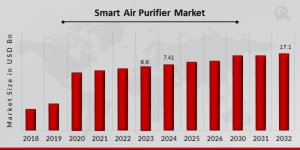Smart Air Purifier Market anticipated to grow 11.02% CAGR, valued at USD 17.1 Billion by 2032 | Xiaomi, Blueair, LG, LTD
Smart Air Purifier Market grows with increasing air pollution, health awareness, and demand for connected home devices.
Smart Air Purifier Market Overview
The smart air purifier market has witnessed significant growth in recent years due to increasing awareness about air pollution, deteriorating air quality, and the rising need for clean and healthy indoor environments. These devices have gained popularity for their ability to purify air by removing harmful particles, allergens, and pollutants such as dust, pollen, smoke, and even bacteria. Moreover, advancements in technology have enabled the integration of smart features, which allow consumers to monitor air quality, control the purifier remotely, and customize settings via mobile apps, making these devices more efficient and user-friendly.
Smart air purifiers use advanced filtration technologies, such as HEPA filters, activated carbon filters, and UV-C light sterilization, to capture and eliminate various airborne contaminants. Many of these devices also incorporate sensors to detect air quality levels and automatically adjust their performance to maintain optimal indoor air conditions. Furthermore, the integration of Wi-Fi connectivity, voice control features, and compatibility with other smart home ecosystems, like Amazon Alexa and Google Assistant, has
Get Free Sample PDF Brochure: https://www.marketresearchfuture.com/sample_request/6895
Key Companies in the smart air purifier market include
Honeywell International Inc. (US)
Xiaomi (China)
LG Electronics (South Korea)
Blueair (Romania)
(South Korea)
Koninklijke Philips N.V (Netherlands)
Sunbeam Products Inc. (US)
Sharp Electronics Corporation (US)
Alencorp (US)
Whirlpool Corporation (US)
Others
Market Trends Highlights
Several notable trends are shaping the smart air purifier market. First, there is a growing consumer preference for multifunctional products that offer not only air purification but also features like humidity control, odor removal, and even smart home integration. As consumers increasingly embrace the concept of smart homes, the demand for air purifiers that seamlessly integrate with other home automation systems is expected to rise.
Another key trend is the growing popularity of compact, portable, and aesthetically pleasing designs, which are driving demand for smart air purifiers. Manufacturers are focusing on making these devices smaller and more efficient without compromising performance. The shift toward smaller, quieter, and more energy-efficient units is evident in the market, as consumers look for products that fit their living spaces and lifestyles.
Buy Now Premium Research Report: https://www.marketresearchfuture.com/checkout?currency=one_user-USD&report_id=6895
Market Dynamics
The dynamics of the smart air purifier market are shaped by various factors that either drive or hinder its growth. Below are the primary market drivers and restraints.
Market Drivers
Increasing Air Pollution: One of the most significant drivers of the smart air purifier market is the rising level of air pollution, particularly in urban areas. The World Health Organization (WHO) has reported that air pollution is a leading cause of respiratory diseases and other health complications. As outdoor air quality continues to decline, consumers are becoming more conscious of the importance of maintaining clean indoor air, which drives the demand for air purifiers.
Health Consciousness: The growing awareness of the adverse health effects of poor air quality, such as asthma, allergies, and respiratory problems, is encouraging people to invest in smart air purifiers. Consumers are increasingly prioritizing health and wellness, driving them to purchase products that contribute to a healthier living environment.
Technological Advancements: Technological innovation is another key driver. The integration of smart features such as real-time air quality monitoring, remote control via mobile apps, and compatibility with other smart home devices has made air purifiers more appealing to tech-savvy consumers. This technology-driven trend has helped air purifiers evolve beyond basic filtration devices to more advanced, user-friendly appliances.
Market Restraints
High Initial Cost: Despite the benefits, the relatively high initial cost of smart air purifiers can deter some consumers from making a purchase. While these devices offer long-term health benefits, the upfront expense can be a significant barrier, especially in price-sensitive markets.
Limited Awareness in Developing Regions: Although smart air purifiers are gaining popularity in developed markets, their adoption in developing regions is slower due to limited awareness, lack of proper infrastructure, and lower disposable income. As a result, manufacturers may face challenges in penetrating these markets.
Market Segmentation
The smart air purifier market can be segmented based on product type, application, and region.
By Product Type:
HEPA Air Purifiers: These are the most popular type of air purifiers in the market, known for their high efficiency in capturing small particles such as dust, pollen, and pet dander.
Activated Carbon Air Purifiers: These purifiers are designed to remove odors and volatile organic compounds (VOCs) from the air.
UV-C Light Air Purifiers: These devices use ultraviolet light to kill bacteria, viruses, and other harmful microorganisms in the air.
Ionic Air Purifiers: These purifiers use charged ions to capture airborne particles and neutralize pollutants.
By Application:
Residential: The residential segment dominates the market as consumers increasingly adopt smart air purifiers for their homes to improve indoor air quality.
Commercial: The commercial sector, including offices, hotels, and healthcare facilities, is also witnessing an increased demand for smart air purifiers to ensure cleaner, healthier environments for employees, guests, and patients.
Browse In-depth Market Research Report: https://www.marketresearchfuture.com/reports/smart-air-purifier-market-6895
Regional Analysis
North America: The North American region holds a significant share of the smart air purifier market, driven by high consumer awareness about health and wellness, along with the prevalence of air pollution in urban areas. The U.S. is the leading market in this region, with demand fueled by the growing adoption of smart home devices and the increasing focus on indoor air quality.
Europe: Europe is another key market for smart air purifiers, with countries like Germany, the UK, and France leading the way. The region is characterized by stringent air quality regulations, which have contributed to the rising demand for air purification solutions.
Asia Pacific: The Asia Pacific region is expected to experience the highest growth in the smart air purifier market, driven by rapid urbanization, rising pollution levels, and growing disposable incomes in countries like China, India, and Japan. The increasing adoption of smart home technologies and the growing middle class are also contributing to the market's expansion in this region.
Middle East and Africa: The Middle East and Africa are emerging markets for smart air purifiers, with air pollution being a major concern in several countries. While market growth is slower compared to other regions, the demand for air purifiers is gradually increasing as consumers become more aware of the health risks associated with poor air quality.
More Related Reports:
Stacker Crane Market: https://www.marketresearchfuture.com/reports/stacker-crane-market-22688
Steel Tubes Market: https://www.marketresearchfuture.com/reports/steel-tubes-market-22690
Wheat Milling Machine Market: https://www.marketresearchfuture.com/reports/wheat-milling-machine-market-22692
Agriculture Equipment Fastener Market: https://www.marketresearchfuture.com/reports/agriculture-equipment-fastener-market-22695
Angle Opening Ball Locator Market: https://www.marketresearchfuture.com/reports/angle-opening-ball-locator-market-22698
Metal Spiral Bellows Market: https://www.marketresearchfuture.com/reports/metal-spiral-bellows-market-22729
Instrument Landing System Market: https://www.marketresearchfuture.com/reports/instrument-landing-system-market-22929
BC531 by leagend Delivers Intelligent Wi-Fi Battery Charging and Testing for Automotive Use
5G In Healthcare Market Forecast 2025-2034: Comprehensive Insights on Market Size, Growth Factors, Trends
Global 5G Chipset Market Growth: Projected To Reach $68.68 Billion By 2029 With An Impressive 32.4% CAGR
Kalendarium
Więcej ważnych informacji
 Jedynka Newserii
Jedynka Newserii

 Jedynka Newserii
Jedynka Newserii

Prawo

Trwają dyskusje nad kształtem unijnego budżetu na lata 2028–2034. Mogą być rozbieżności w kwestii Funduszu Spójności czy dopłat dla rolników
Trwają prace nad wieloletnimi unijnymi ramami finansowymi (WRF), które określą priorytety wydatków UE na lata 2028–2034. W maju Parlament Europejski przegłosował rezolucję w sprawie swojego stanowiska w tej sprawie. Postulaty europarlamentarzystów mają zostać uwzględnione we wniosku Komisji Europejskiej w sprawie WRF, który zostanie opublikowany w lipcu 2025 roku. Wciąż jednak nie ma zgody miedzy państwami członkowskimi, m.in. w zakresie Funduszu Spójności czy budżetu na rolnictwo.
Konsument
35 proc. gospodarstw domowych nie stać na zakup mieszkania nawet na kredyt. Pomóc może wsparcie budownictwa społecznego i uwolnienie gruntów pod zabudowę

W Polsce co roku oddaje się do użytku ok. 200 tys. mieszkań, co oznacza, że w ciągu dekady teoretycznie potrzeby mieszkaniowe społeczeństwa mogłyby zostać zaspokojone. Jednak większość lokali budują deweloperzy na sprzedaż, a 35 proc. gospodarstw domowych nie stać na zakup nawet za pomocą kredytu. Jednocześnie ta grupa zarabia za dużo, by korzystać z mieszkania socjalnego i komunalnego. Zdaniem prof. Bartłomieja Marony z UEK zmniejszeniu skali problemu zaradzić może wyłącznie większa skala budownictwa społecznego zamiast wspierania kolejnymi programami zaciągania kredytów.
Problemy społeczne
Hejt w sieci dotyka coraz więcej dzieci w wieku szkolnym. Rzadko mówią o tym dorosłym

Coraz większa grupa dzieci zaczyna korzystać z internetu już w wieku siedmiu–ośmiu lat – wynika z raportu NASK „Nastolatki 3.0”. Wtedy też stykają się po raz pierwszy z hejtem, którego jest coraz więcej w mediach społecznościowych. Według raportu NASK ponad 2/3 młodych internautów uważa, że mowa nienawiści jest największym problemem w sieci. Co więcej, dzieci rzadko mówią o takich incydentach dorosłym, dlatego tym istotniejsze są narzędzia technologiczne służące ochronie najmłodszych.
Partner serwisu
Szkolenia

Akademia Newserii
Akademia Newserii to projekt, w ramach którego najlepsi polscy dziennikarze biznesowi, giełdowi oraz lifestylowi, a także szkoleniowcy z wieloletnim doświadczeniem dzielą się swoją wiedzą nt. pracy z mediami.









.gif)

 |
| |
| |
|